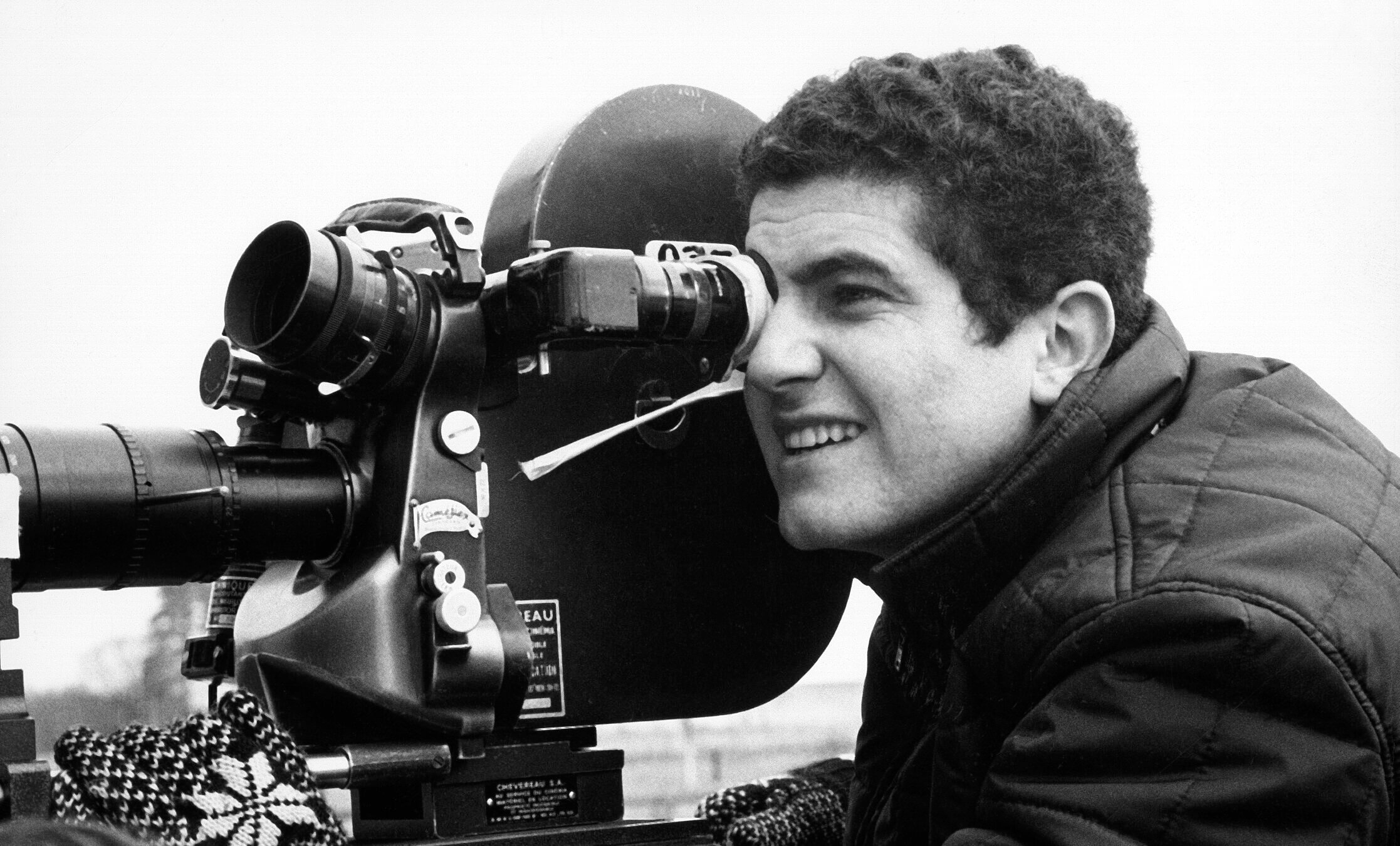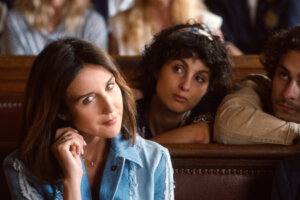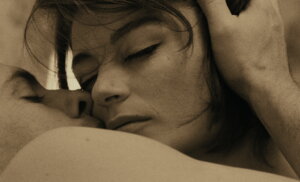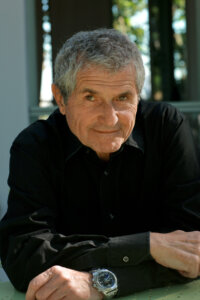At 87, one of the great Jewish film directors thinks there’s still time to start over
Vaulted to stardom with ‘A Man and a Woman,’ Claude Lelouch returns with his latest work, ‘Finalement’

Claude Lelouch on the set of ‘A Man and a Woman.’ Courtesy of Films13
Even if writer, director and cinematographer Claude Lelouch had the opportunity to redo his much admired and oh, so romantic A Man and a Woman, he wouldn’t change a thing.
It was, after all, the international hit that put him on the map, earning him two Academy Awards (Best Foreign Film and Best Original Screenplay) and set an all-time record at the Paris Theater where it ran for 65 weeks in 1966 and 1967. In Los Angeles it ran for more than 2 years at the Plaza Theater in Westwood.
With its haunting score the film recounts the evolving relationship between a widow and widower who find love again.
“It’s a timeless story,” the 87-year-old Lelouch stressed in French, while his interpreter, Nicholas Elliot, rapidly translated into English. “Feelings haven’t changed. The only thing that hasn’t progressed since the dawn of time is love. And it gave me so much satisfaction to make it.”

Still, he admitted, as we spoke in a small conference room at the Film Forum in the West Village, that by current standards some of the dialogue could be updated, such as our hero telling our heroine that she is too pretty for a serious conversation.
“When a woman is very beautiful, that overwhelms everything else,” Lelouch said. “Today, I might say that line differently. But in all my films, across 51 films, I express my love for women. I owe everything to them. From my mother to my current wife.”
The youthful Lelouch, who is at once reserved and paradoxically ebullient, is in New York to celebrate a new restoration of A Man and a Woman, a mini-retrospective of his work, and the American premiere of his 51st and most recent film, Finalement.
Lelouch is perhaps best known for his intense love stories, complex characters and an aesthetic that is not easy to define. His movies often employ music and dance and production numbers. Flashbacks may depict actual events or stream of consciousness images or dreams. Scenes from his earlier films may be incorporated to highlight particular themes while also serving as in jokes.
The Lelouch retrospective also features the comic-dramatic heist, La Bonne Annee, (1973), And Now My Love (which was 1974 nominated for a 1974 Academy Award for Best Screenplay); the murder mystery Cat And Mouse (1975), Les Miserables (1995), a WWII update of Victor Hugo’s novel starring Jean-Paul Belmondo: and Les Uns Et Les Autres (1981), boasting an all-star cast including Geraldine Chaplin and James Caan.
Several of his pictures reference World War II, the Holocaust, and Jewish themes, topics which have special resonance for Lelouch, the son of a French Algerian Jewish father and a Catholic-born mother who converted to Judaism so that he could be raised as a Jew.

Thanks to her insight and fortitude she and her son were able to elude the Gestapo between 1942-1944 by holing up in movie theaters in each city as they fled across France, an experience which inspired him to pursue a career in film.
“I fell in love with cinema,” he recalled. “It was my nanny. I was a turbulent child and movies calmed me down. I very quickly realized that the people on screen were just like us, only braver, more attractive, more intelligent. I wanted to hang out with these people. Cinema was a natural for me. I started making amateur films when I was seven or eight and it’s the only thing I’ve done professionally my whole life.”
After the war, his father gave him a camera which he used to chronicle actual events, including life in the Soviet Union, shot with the camera concealed under his coat. He also photographed such sporting events as the Tour de France. As a young man in the French army’s film unit in the 1950s, he worked on over 100 films.
When I asked him who were his aesthetic influences he said, only half kidding, virtually everyone from Chaplin to the Russian director Mikhail Kalatozov.
“By the time I was born, we had Snow White and Renoir’s Grand Illusion,” he said. “During the war I only saw French and German films that the government allowed. Mostly comedies. I never saw an American film until after the liberation. I stole from everybody before I created my own vision, which is a positive vision.”
“We live in a world of negativity where the negative outweighs the positive,” he went on to say. “People are more interested in bad news. What I’m interested in is good news. I can never thank enough the people who said ‘No’ to me because they allowed me to find the people who said, ‘Yes.’ Everything that ever hurt me in the end did me good. In the end, the bad invents the good.
“What is life but a series of pain in the asses in a world of marvels?” he asked rhetorically. “But since the marvels always outweigh the pain in the asses I’m always happy to get up in the morning.”
Despite his Panglossian sensibility he acknowledged that we are now at a precipitous turning point. Still, he almost views our global condition as a well-done unfolding existentialist film and hopes for a positive conclusion.
“Look at the history of the world,” he said. “It is built on a mountain of horrors and today the world is incredible. We have the tools to create a new world or precipitate the end. There has never been greater suspense.”

All of his movies, he told me, are based on what he has or is observing. “I work with a great screenwriter, life,” he said. “I am a reporter of life, although the characters in my films are a little less gross than those in life. I film what I love. I love love. I love life most, despite the current spectacle to which I am a witness.”
His journey has proven to be rich cinematic fodder, not least some of his more vivid wartime experiences.
In Les Uns Et Les Autres, he tells the story of four musical families (German, French, American and Russian, respectively) during World War II whose lives interconnect across different time periods and locations. Each narrative based on actual events gave him the opportunity to explore the horrors of war, the primal instinct to survive and the vagaries of fate.
In one episode, the Gestapo enters a classroom of young French boys to ferret out the presence of Jews. They demand that all the boys drop their trousers. When an SS guard encounters a circumcised youngster, the gentile teacher quickly explains that he was circumcised because he peed sideways and the procedure was necessary for sanitary reasons. The Nazi soldier then asks the boy to recite something from the New Testament and he complies.
The scene is a compilation of true life experiences although Lelouch took poetic license with the settings and characters. In actuality, Lelouch was saved by a Catholic priest who turned him into a choir boy and taught him the Catholic Mass. That knowledge spared Lelouch’s life when a Nazi soldier demanded that he recite it.
To this day, Lelouch’s ethnic identity is a complex amalgam.
“My mother became a Jew, but she continued going to church,” he said. “I went to synagogue as much as I went to church. I love priests and rabbis. I loved my father and my mother. They both gave me the best advice in life and that is the middle way. I believe the truth is halfway between what they both believed. I straddle two religions, which I see as complementary.”
He paused. “But I love Jews the way I love women, which is to say they are very complicated people. I am moved by Jews because they make things complicated. I try to simplify, especially in filmmaking. Jews look for perfection and that raises many questions. I am very divided. I am sad. Jews are in a permanent state of war. Like women. Jewish mothers are something special. I love mommies who have an almost abnormal love for their children. My Catholic mother was a Jewish mother.”
I steer the conversation to the sticky question of whether one should or shouldn’t separate the artist (his behavior and political leanings) from the artistry. In Les Uns Et Les Autres, a character, loosely inspired by the Nazi sympathizing German conductor Van Karajan, arrives at Carnegie Hall after the war to find no one, short of two critics, in the audience.
“I have mixed feelings,” he said. “Artists have flaws. We all have flaws. It’s hard to separate artists from their judgments. No one is safe from making mistakes. As I’ve aged I’ve become more tolerant. I now forgive everyone for everything. Forgiveness is the aristocracy of intelligence.”
In some fundamental way the theme of forgiveness is central to his latest film, Finalement, a kind of picaresque road trip film about a lost soul lawyer who has wronged many people and is looking to find meaning in his own life and redemption.
“The film is a logical continuation of my observations and it’s an accurate rendition of what I feel,” Lelouch said. “The world is now a place with a lot of burn-out. People have never felt so uncomfortable in their own skin. And that’s what I’ve filmed here.”
“But it’s still a story told from a positive perspective,” he added. “If one is brave enough one can still start over. This is a story about a man who would like to start over. I would love to take my 87-year-old man’s experience and be 20 again. But that’s impossible.”
The Lelouch films, distributed by Rialto Pictures, are showing at Film Forum through April 17 after which they will play at the Laemmle Theaters in L.A.















